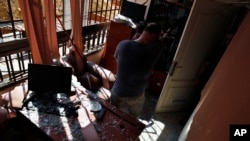Recent airstrikes carried out by Israel against Iranian targets in Syria and Iraq highlight a clear escalation of tensions between the two rival countries, analysts warn.
Several Israeli airstrikes hit Iranian targets late Saturday near the Syrian capital, Israeli military said.
The late Saturday attack that hit an Iranian military target near the Syrian capital of Damascus came as a response to a drone attack that Iranian Revolutionary Guard Corps Quds Force was planning to carry out on Israeli territory, according to Ronen Manelis, an Israeli military spokesperson.
Prior to the attack, Israeli Prime Minister Benjamin Netanyahu said in a tweet that his military was able to foil the planned Iranian drone attack on Israel.
“In a major operational effort, we have thwarted an attack against Israel by the Iranian Quds Force and Shi'ite militias,” he said, adding that Israeli “forces operate in every sector against the Iranian aggression.”
Clear links
Last month, Israel reportedly launched another attack on a Shi’ite militia base in Iraq that was used as an Iranian weapons depot.
While Iraqi and Israeli governments have not confirmed who was behind the attack, U.S. officials said last week that Israel was responsible for the July attack in Iraq.
“There is a clear link between this [weekend’s] attack in Syria and the one carried out last month in Iraq,” said Watheq al-Hashimi, director of the Iraqi Group for Strategic Studies, a Baghdad-based research group.
“The next phase will witness a very dangerous escalation between Iran and Israel,” al-Hashimi told VOA, adding that “Iran will find a way to respond to these attacks directly or indirectly.”`
The Iraqi analyst said that any potential confrontation between the two sides would “impact Iraq significantly.”
“Syria has already been a target of Israeli attacks, so as long as some leaders of [Iranian-backed Shi’ite militias] Popular Mobilization Forces remain loyal to Iran at the expense of the Iraqi government sovereignty, Israel will continue its strikes on their targets inside Iraqi territory,” al-Hashimi said.
He added that Israel has exploited the “weakness” of Iraq as a country that has close ties with Iran.
From covert to overt war
Other experts rule out the possibility of an all-out war between Israel and Iran, while foreseeing a risk of “further deterioration.”
“There is an escalation from both sides on three main dimensions,” said Ronen Bergman, an Israeli national security analyst and author of the book "Rise and Kill First: The Secret History of Israel's Targeted Assassinations".
“The first one is that the covert war [between Israel and Iran] is becoming more overt,” he told VOA. “The war that Israel and Iran have been engaged in for the last five years in Syria that both sides were keeping low-profile is now becoming more public.”
Another dimension, Bergman said, would be “what was more confined in Syria is now much more widely spread in Iraq, Lebanon and maybe other territories.
“The third dimension is the escalation of statements from Israeli and Iranian officials,” he added.
Precise strikes
Since the beginning of Syria’s civil war in 2011, Israel has occasionally targeted Iranian and Hezbollah bases in Syria.
Iran and its proxy Hezbollah have built a growing military presence in Syria in support of President Bashar al-Assad’s regime. They have been instrumental in major gains made by the regime against Syrian rebel forces throughout the country, particularly in Aleppo, Homs, Daraa and Damascus suburbs.
Israel, however, fears that Iran could use these military gains to wage attacks on Israeli territory from Syria.
Seth Frantzman, a Jerusalem-based Middle East analyst and author of the book "After Isis: America, Iran and the Struggle for the Middle East", says that Israel’s main objective from such airstrikes is to limit Iranian military presence in Syria.
“These airstrikes on Iranian targets tend to be precise and are against specific dangers such as drones and missiles,” he told VOA.
“It doesn’t appear that the airstrikes themselves have led to reduction of Iranian presence, which means they don’t degrade Iran’s overall entrenchment in Syria,” Frantzman added.
But analyst Bergman said the effectiveness of “these Israeli attacks on the Iranian military establishment in Syria should be measured based on their impact on what the Iranians have tried to achieve in reality.”
Targeting Hezbollah
Since the 2006 war, Israel and Hezbollah have occasionally exchanged attacks. In the wake of Syria’s war, Israel has also hit Hezbollah targets inside Syria.
But Hezbollah, designated by the U.S. as a terrorist organization, said Sunday that two Israeli drones have crashed in Lebanon overnight.
The second drone fell on a building that houses Hezbollah’s media center in the Dahyeh suburbs of Lebanon's capital, Beirut.
“We did not shoot down or explode any of the drones,” Hezbollah spokesman Mohammed Afif told the Associated Press.
But Hezbollah leader Hassan Nasrallah said during a televised speech on Sunday that his group will respond against any such Israeli attacks in the future.
“From now on, we will confront Israeli drones when they enter Lebanon’s airspace and we will shoot them down,” he said.
The Israeli government has not commented on the alleged Israeli drone attack.
In a July interview, Hezbollah leader Hassan Nasrallah said his group is now capable of striking anywhere in Israel, adding that “in all fields, the resistance has developed in quantity and quality.”
The Lebanese militant group has been increasingly targeted by U.S. sanctions in recent months for its activities in Syria and role in assisting Iran’s agenda in Lebanon.




